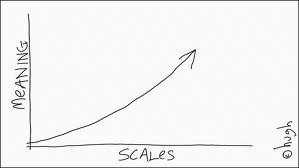Dr. Robert
Emmons, a prolific researcher and professor at the University of California,
recently wrote:
“As far
as we know, humans are the only meaning-seeking species on the planet. ‘Meaning-
making’ is an activity that is distinctively human, a function of how the human
brain is organized.The
many ways in which humans conceptualize, create, and search for meaning has
become a recent focus of behavioral science on the quality of life and
subjective well-being.”
 A
A
tremendous amount of research and writing on the connection between human
performance and the meaning people find in their work has started to emerge
because of this focus. And, some of the
heavy-hitters in the business world were quick to take notice of these
discoveries.
Here
are some examples of how much attention is being paid to “meaning-making” at
work:
- Research at McKinsey and Company
has led to actionable strategies and tasks that help infuse meaning in the work
of individuals and organizations. These
findings were based on research done by social scientists. Their full
perspective and recommendations can be found in Beyond Performance: How
Great Organizations Build Ultimate Competitive Advantage - Gary
Hamel, ranked by the Wall Street Journal as the
world’s most influential business thinker, and who Fortune magazine
called “the world’s leading expert on business strategy" is encouraging
managers to see themselves as “entrepreneurs
of meaning.” - One of my favorite
psychological researchers, Mikel Csìkszentmihàlyi, writes extensively about
“the making of meaning” in his book Good Business.
I want
to emphasize that the research being done in this area is far from the touchy-feely
anecdotes or inspirational speaker clichés that sometimes sound similar. I have
little tolerance for methods and insights that are not based on research. Once you push through the surface language,
there is substance behind this topic that leads to real and measurable
performance improvements.
There
is far too much to share with you about this subject matter in one blog edition,
but here are a few examples that will get you thinking about the importance of
meaning at work. These examples were
compiled by Susie Cranston and Scott Keeler at McKinsey and Company:
1.
Emerson Electric
"David
Farr, chairman and CEO of Emerson Electric…. is known for asking virtually
everyone he encounters in the organization four questions:(a) How
do you make a difference? (testing for alignment with the company’s direction)(b) What
improvement idea are you working on? (emphasizing continuous improvement)(c) When
did you last get coaching from your boss? (emphasizing the importance of people
development)(d) Who
is the enemy? (emphasizing the importance of 'One Emerson' and no silos, as
well as directing the staff’s energy toward the external threat).The motivational
effect of this approach has been widely noted by Emerson employees."
2.
Wells Fargo
"The
CEO of Wells Fargo, John Stumpf, marked the first anniversary of its change
program by sending out personal thank-you notes to all the employees who had
been involved, with specific messages related to the impact of their individual
work."
3. PepsiCo
"Indra
Nooyi, CEO of PepsiCo, sends the spouses of her top team handwritten thank-you
letters. After seeing the impact of her own success on her mother during a
visit to India, she began sending letters to the parents of her top team, too.Some
managers might dismiss these as token gestures—but employees often tell us that
the resulting boost in motivation and in connection to the leader and the
company can last for months if not years.As Sam
Walton, founder of Wal-Mart Stores, put it, 'Nothing else can quite substitute
for a few well-chosen, well-timed, sincere words of praise. They’re absolutely
free—and worth a fortune.'”
Don't
get me wrong, working hard and expecting everyone else match your level of
effort can be a powerful motivator. However, that philosophy has limitations.
As
human beings, we need more. Science is
telling us that the “more” we’re looking for is meaning in our work. Make sure your agents and employees
understand and buy-into the meaning behind their tasks. If they don’t, they’ll not reach their
maximum potential and your team will suffer.
Question: How do you help infuse your organization with
meaning? What communication techniques
have you tried and found effective?
Join the WorkPuzzle Discussion at the Tidemark Online Community (TMOC)
Engage in the WorkPuzzle discussion by joining the TMOC private social network. Commenting on a public blog like WorkPuzzle can be a little intimidating, so why not join the discussion inside the privacy of the TMOC discussion group?
By joining TMOC, you'll get to see who else is in the group and your comments will only be seen by those whom you trust. Joining TMOC is quick, easy, and free (no kidding…this takes less than 2 minutes). To get started, click here.
Already of a member of TMOC? If so, join the WorkPuzzle Dialog Group by clicking on the WorkPuzzle Group icon on the left side of your TMOC homepage. Questions? Email the WorkPuzzle editor (workpuzzle@hiringcenter.net) and we'll walk through the process.
 Editor's Note: This article was written by Dr. David Mashburn. Dave is a Clinical and Consulting Psychologist, a Partner at Tidemark, Inc. and a regular contributor to WorkPuzzle.
Editor's Note: This article was written by Dr. David Mashburn. Dave is a Clinical and Consulting Psychologist, a Partner at Tidemark, Inc. and a regular contributor to WorkPuzzle.

